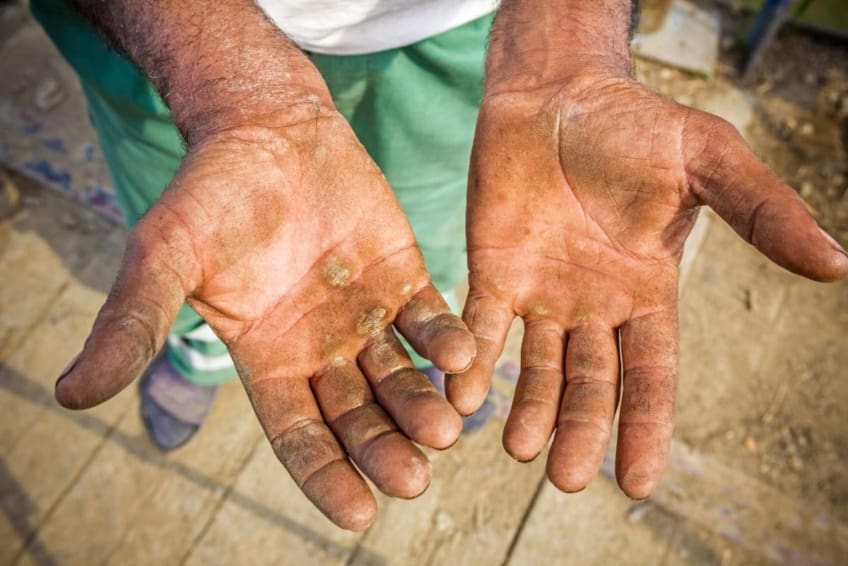
Did you know your skin is your body’s largest organ? It is. And it’s important to keep it safe, whether you’re at home or at work.
Workers of all ages can have job-related skin problems. They are more common in certain occupations, such as:
- Manufacturing
- Food production
- Construction
- Machine tool operation
- Printing
- Metal plating
- Leather processing
- Engine service
- Landscaping
- Farming
- Forestry
- Health care
Path to improved health
Skin diseases and injuries come in several forms. The most common problems are skin rashes and irritation. These are often known as dermatitis. You can get it from contact (touching something) or allergies.
Contact dermatitis occurs from frequent contact with substances, such as:
- Water
- Soap or detergent
- Chemicals
- Acids or alkalis
- Oils and greases
- Heavy metals
Over time, the repeated contact removes natural oils from your skin. This can cause your skin to crack and dry out. The substances can block your skin pores and cause acne or inflammation. Some can cause painful burns.
Even small amounts of certain substances may cause allergic dermatitis. Those common in workplaces include:
- Glues or adhesives
- Epoxies
- Textile dyes or resins
- Chemicals
- Latex
- Poisonous plants, like oak or ivy
Dermatitis symptoms range from the following:
- Dry, rough, or flaky skin
- Hives or rashes
- Blisters (with or without pus)
- Redness
- Itching
- Burning
- Swelling
- Tight or stiff skin
You also can get cuts, scrapes, or bruises at your workplace. Tools, machines, and instruments can be the cause. Repeated contact or friction also can cause injuries. These may develop into worse problems, especially if infected.
Some workers are at risk of skin cancer. This applies if you work outside or are exposed to the sun or radiation. It often takes a while for skin cancer symptoms to appear.
Things to consider
The Occupational Safety and Health Administration (OSHA) requires workplaces to provide a Material Safety Data Sheet (MSDS) for every chemical used at your workplace. This sheet lists the known risks for skin irritations, allergies, or cancer. Be sure to read and reference each MSDS your company provides.
Take precautions to keep yourself and your workplace safe and prevent skin problems. Follow these recommendations:
- Keep your workplace clean.
- Store all chemicals safely and label them correctly.
- Use proper waste containers.
- Keep eye baths and safety showers available.
- Have an MSDS for every dangerous substance used in your work.
- Wear protective items, such as gloves, aprons, hats, masks, long-sleeved shirts, and pants. These protect your skin from contact with chemicals or machines.
- Wear clean clothes to work. Take off oil- or chemical-soaked work clothes before leaving.
- Do not clean your hands or other skin areas with chemicals. These include gasoline, kerosene, mineral spirits, and turpentine.
- After washing your hands, protect them with lotion, cream, or petroleum jelly.
- Know your workplace’s safety processes. For instance, what do you do if your skin comes in contact with a harmful substance? Know how to get it off your skin and how to get medical help.
- Do not eat, drink, or smoke in your work area. This can bring chemicals in close contact with your skin.
- If you work outside, apply sunscreen throughout the day. You also should wear sunglasses, a wide-brimmed hat, and clothing that covers your body.
- If you work with radiation, wear protective clothing and gear to prevent exposure.
- See if you can use a tool—instead of your hands—to handle dangerous materials.
Questions for your doctor
- How do I know if I’m allergic to certain substances or materials?
- How long does dermatitis last?
- What is the best treatment for dermatitis?
- How can I work with my employer to reduce the risk of getting a skin-related problem?
![]()
Copyright © American Academy of Family Physicians
This information provides a general overview and may not apply to everyone. Talk to your family doctor to find out if this information applies to you and to get more information on this subject.










